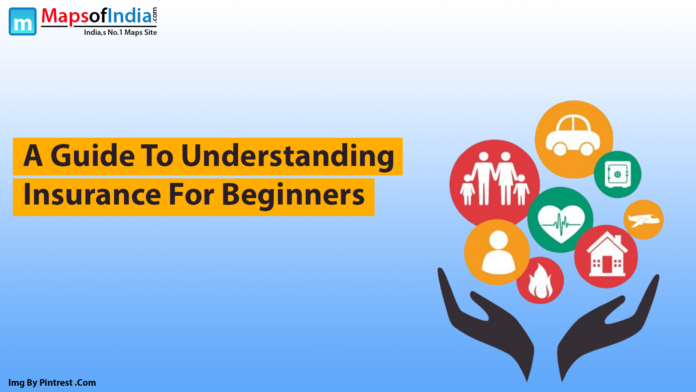It is very puzzling for a beginner to learn about insurance since it has so many terminologies, types, and options that, at certain points, it can appear too complex and even scary. Yet, knowing about insurance is vital since it provides a safety net for unprepared obligations. Insurance protects health, home, car, or life and is crucial in helping you manage risks and prepare for the future. This guide seeks to break down the basics of insurance for beginners – so that you understand how important it is and how to make informed decisions.
What Is Insurance?
Insurance refers to the kind of contract between you and the insurance company. Generally, it protects you against several types of risks, including accidents, illness, or any damage to your property. In exchange for agreeing to pay certain financial losses from specific events, you pay regular instalments called premiums to the insurance company based on the type of insurance policy.
Insurance is premised on the management of risk. When you purchase insurance, you transfer the financial risk of an unexpected event to the insurance company. This would mean that when a disaster or accident occurs, you would not individually bear the full financial expense of it.
Key Terms to Learn
Before delving into different types of insurance, it is helpful to learn some general insurance language:
- Premium: The money you pay to the insurance company, usually monthly, quarterly, or annually for your policy to be active.
- Deductible: The money you must pay before your insurance takes over.
- Coverage: Protection offered by your insurance, including what is covered and what is not.
- Claim: A document issued to the insurance company requesting payment or compensation for a covered event.
- Policyholder: The one who owns the insurance policy.
Different Forms of Insurance
Numerous forms of insurance are designed to protect different facets of your life. Here is a listing of the most common:
Health Insurance
Health insurance covers all your doctor bills, including hospital care, surgery, prescriptions, and doctor visits. Without question, carrying health insurance ensures you never have to be troubled by large doctor bills when you get ill or are injured. Here is what to look for when choosing a health insurance plan:
- Premiums: How much do you pay per month?
- Network of doctors: Are those physicians you want to have covered?
- Coverage: Does it cover what you need, such as hospitalisation, maternity care, or dental care?
Health insurance is a must for everyone. Medical expenses can add up quickly, especially in emergencies.
Life Insurance
Life insurance is secured to offer financial protection to your dependents in case of death. The policyholder pays premiums, and the insurer pays a lump sum, the death benefit, to the nominated beneficiaries if they die. There are various kinds of life insurance:
- Term Life Insurance: It covers an individual for a specific number of years, such as 10, 20, or 30. If the individual dies during that term, the death benefit is paid to beneficiaries.
- Whole Life Insurance: It covers the policyholder until his death and has an investment component known as cash value.
The type of life insurance to choose depends on your goals and how long you require the coverage.
Auto Insurance
Car insurance covers you financially in case of accidents or damages to your automobile. It also caters for liability if you cause an accident that damages someone else’s property or inflicts injuries on someone. Car insurance typically encompasses the following covers:
- Liability cover: Compensation for damage or injuries to other people in scenarios where you are at fault.
- Collision cover: Compensation for damages to your vehicle in any accident.
- Comprehensive coverage: It covers non-collision-related damages, such as theft or damage caused by fire or natural disasters.
Many countries have made car insurance mandatory, which can be a relief because you know you are covered in case of accidents.
Home Insurance
Home insurance ensures that your property, along with its contents, receives protection in the form of compensation in case of damage or loss. Liability is also protected if a person gets hurt while visiting your property. The typical policy contents of home insurance include:
- Property protection: This is the cover against fire, storm, theft, or vandalism to your house.
- Liability coverage: Protects against a lawsuit should someone get injured on your property.
- Personal belongings coverage: This replaces damaged or stolen personal items.
Every homeowner needs this kind of insurance to protect his property and avoid significant financial setbacks due to unexpected events.
Disability Insurance
Disability Insurance provides income replacement if you are ill or injured and cannot work. It will ensure that your rents or mortgages continue being paid, despite your inability to generate regular income. Two types of disability insurance exist:
- Short-term Disability Insurance: pays a short-term period, usually from a few weeks to a few months.
- Long-term disability insurance: This provides extended coverage that may last a few years or until you attain retirement.
Disability insurance will be necessary for anyone whose income is heavily based on being able to work. It would allow a stable cash flow in the event of some unforeseen occurrence.
How to Choose the Best Insurance for You?
The other consideration is determining the right kind of insurance policy, considering all aspects of one’s needs, budget, and the desired level of coverage. Some factors to consider are:
- Assess your risks: Identify what areas of your life you want to cover- your health, life, property, or income.
- Compare policies: Shop around and compare various providers’ premiums, coverage, and exclusions.
- Understand the fine print: Read through the terms and conditions of the policy carefully and understand what is covered and what is not.
- Obtain advice: You can seek help from an insurance agent or broker to choose the right plan against your requirements.
Insurance plays a very important role in the elementary process of risk management, protecting you and your family against unexpected financial disasters. Understanding the basics of insurance, from types of coverage to the use of key terms, can help you make good decisions and ensure that you get the right kind of insurance that suits you best. Properly selecting the right insurance plan provides peace and financial security during those unforeseen events.




